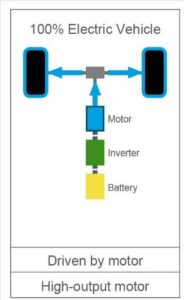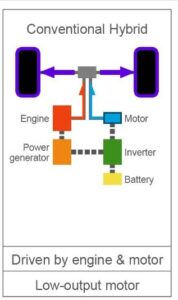
In the rapidly changing world of modern cars, choosing between leasing a hybrid or an electric car for your next vehicle is not just a matter of preference; it’s a decision that reflects your lifestyle, driving habits, and environmental awareness.
This article explores the key aspects of leasing a hybrid or electric car, compares electric and hybrid options, and provides the information necessary to make an informed choice.
Understanding the Basics: Hybrid vs. Electric Cars

EV Drive Train

Hybrid Drive Train
At its core, a hybrid vehicle marries a traditional internal combustion engine (ICE) with one or more electric motors.
It uses a battery that recharges itself through regenerative braking and the ICE. ‘Regenerative braking’ is a feature that allows the electric motor to act as a generator to recharge the battery when the driver applies the brakes, converting the moving vehicle’s kinetic energy into stored energy in the battery.
This blend aims to offer better fuel efficiency and lower emissions than solely petrol-powered cars.
On the flip side, electric vehicles (EVs) are powered exclusively by electric motors, drawing energy from rechargeable batteries.
EVs stand out for producing zero emissions, being quieter, and generally having lower operating costs compared to their hybrid and ICE counterparts.
Leasing a Hybrid Car: Pros and Cons
The Advantages of Leasing a Hybrid
Fuel Efficiency: Hybrids are designed to optimise fuel use, making them a fantastic choice for drivers with mixed city and highway commutes.
Reduced Emissions: Hybrids emit fewer pollutants than traditional cars by combining electric power with petrol.
No Range Anxiety: Thanks to the backup petrol engine, you can travel as far as you like without worrying about the next charging station.
The Drawbacks of Leasing a Hybrid Car
Higher Initial Cost: The advanced technology of hybrids can make their lease rates slightly higher than standard vehicles.
Complexity and Maintenance: A hybrid might have higher maintenance costs down the line, as it has more mechanical parts than an EV.

Leasing an Electric Car: Pros and Cons
The Advantages of Leasing an Electric Car
Zero Emissions: EVs are a cornerstone in the fight against climate change, emitting no pollutants from the tailpipe.
Lower Running Costs: Electric cars are cheaper, benefiting from lower electricity costs than petrol and fewer moving parts requiring maintenance.
Performance and Quietness: Electric motors offer instant torque, providing a quick and quiet driving experience.
However, hybrid cars also offer a smooth and quiet ride, thanks to the electric motor’s contribution to the propulsion.
The main difference in performance is that electric cars tend to have quicker acceleration due to the instant torque provided by the electric motor.
The Drawbacks Of Leasing an Electric Car
Range Limitations: Although improving, the range of EVs can be a concern for those with long commutes or a penchant for road trips.
Charging Infrastructure: Depending on where you live, access to charging stations might not be as convenient as filling up at a gas station.
However, with the increasing popularity of electric cars, more charging stations are being installed in urban areas, making it easier to find a charging point.
Read More about your EV cradle-to-grave
Making Your Choice Of Car: Lifestyle Considerations
Choosing between a hybrid and an electric car lease boils down to aligning the vehicle’s capabilities with your daily requirements and long-term goals.
City Dwellers: An electric car offers an efficient and eco-friendly solution if you mostly navigate urban streets with regular access to charging points.
Long Commuters: A hybrid could eliminate range anxiety while reducing fuel consumption for those with extended commutes or frequently travelling long distances.
Eco-Conscious Drivers: If minimising your carbon footprint is paramount, leasing an electric car represents the pinnacle of personal automotive sustainability.
Financial Implications
While leasing a hybrid or an electric car might result in a higher monthly payment than traditional vehicles, the reduced fuel and maintenance costs can balance the scales.
Additionally, government incentives for leasing eco-friendly vehicles can further alleviate the financial burden, making them a smart choice for budget-conscious leasers. This financial advantage should give you the confidence to consider these options seriously.

The Future is Green
As the automotive industry marches toward a more sustainable future, the options for eco-conscious drivers continue to expand.
With significant technological advancements, the performance, range, and affordability of hybrids and electric cars are set to improve, and deciding to lease one is an increasingly attractive proposition.
This progress should give you optimism about the future of these vehicles and their potential to meet your needs.
Whether a hybrid or an electric car lease is right for you hinges on a multitude of factors, including your driving habits, access to charging infrastructure, financial considerations, and environmental priorities.
By carefully evaluating these aspects, you can select a vehicle that suits your lifestyle and supports the global shift towards cleaner, more sustainable mobility solutions.
Learn more about where your EV comes from and the global impact.
- The Peugeot 408: A Premium Hybrid That Stands Out - December 18, 2024
- UK Auto Industry Challenges Amid EV Transition - December 11, 2024
- EV Charging Costs in AA Report for October 2024 - December 6, 2024